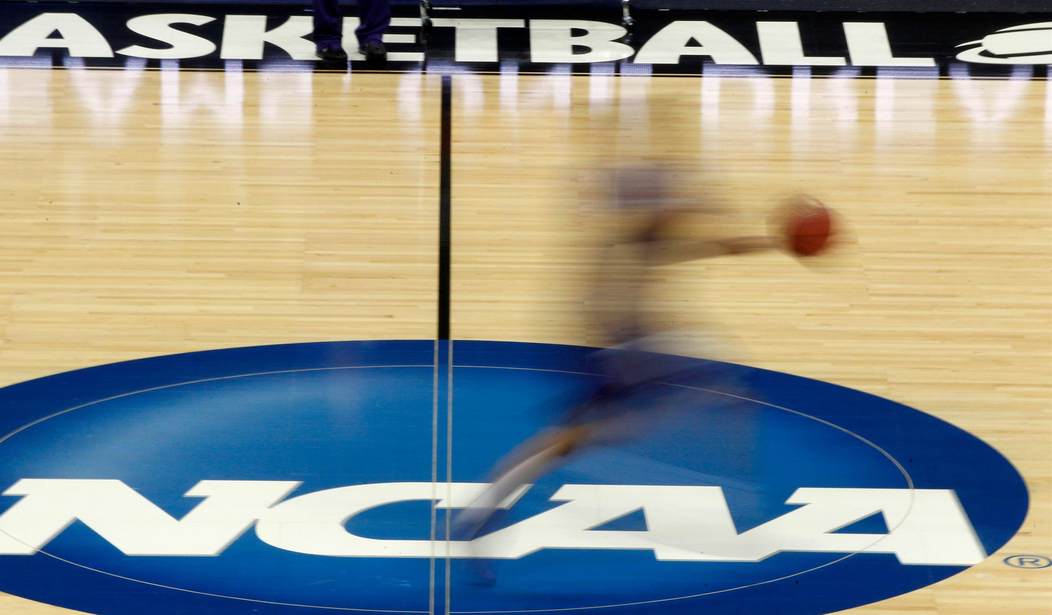The NCAA Board of Governors issued a statement on Monday confirming explicitly that which it has only evidenced in the past by its decision-making — the NCAA will not schedule championship events in states that pass legislation ensuring that female athletes will be provided the opportunity to compete against other female athletes — not including “transgender” female athletes.
When determining where championships are held, NCAA policy directs that only locations where hosts can commit to providing an environment that is safe, healthy and free of discrimination should be selected. We will continue to closely monitor these situations to determine whether NCAA championships can be conducted in ways that are welcoming and respectful of all participants.
It has been mistakenly reported in various places that this announcement is the result of some states having empowered the NCAA to take this step by demonstrating a willingness to “cave-in” to the transgender activists by either not passing or watering down proposed legislation establishing “girls-only” sporting competitions under state law. But that claim is simply not true — the NCAA has had a “non-discrimination” policy under which it includes transgender athletes for more than a decade, and it removed seven scheduled national championship events from North Carolina in 2016 in response to the “Bathroom Bill” passed in the state. That law prohibited transgender persons from using the public bathroom of the gender they identified with rather than the bathroom corresponding to their biological sex.
In February 2020, the NCAA was considering how to respond to a newly passed Idaho statute establishing “girls only” sporting contests because a Regional Round of the upcoming NCAA Men’s Basketball Championship was to be held in Boise in March 2020. It became unnecessary for the NCAA to act because the emergence of the COVID-19 pandemic forced the cancellation of the event. The facts are that the NCAA has consistently taken the position that it will include “transgender” athletes under its “non-discrimination” policy, and it will not have NCAA Championship events played in locations where it believes that policy is being violated.
I have twice written about South Dakota Gov. Kristi’s Noem’s justified refusal to sign legislation passed by the South Dakota legislature that I viewed as seriously flawed and likely to be struck down in Court. Critics of her decision argued that she was caving in to corporate interests in the state whose only concern was for economic losses they would suffer if the NCAA excluded South Dakota as a hosting site for championship events. Some believed that the NCAA needed to be confronted on the issue, and not appeased.
A few states have joined Idaho in passing new laws intended to secure “girls only” athletic opportunities and competitions. Mississippi, Tennessee, and Arkansas also passed legislation on the subject, with the Governors of Mississippi and Tennessee signing the bills sent to them, but Arkansas Gov. Asa Hutchison vetoed the bill sent to him only to have his veto overridden.
Not widely known is the fact that similar legislation is currently pending in 20 other states, and the NCAA statement yesterday is likely meant as a warning to those states in order to attempt to slow down the progress of those bills.
One of the justifications given by Gov. Noem for her decision to not sign the bill sent to her was the fact that it included college athletics within its scope. Her view was that dealing with the issue of adult transgender participation and juvenile transgender participation warranted different approaches. In terms of dealing with the NCAA and college sports, she suggested that a multi-state approach to dealing with the NCAA was preferable to 50 states taking 50 different approaches on the subject and that she would work with the Governors of other states concerned about the subject to address the NCAA on a unified basis.
As more states step forward and pass legislation, the NCAA is going to be put to the test. There are events on the immediate horizon — within the next 90 days — where it may become possible for the events to be played at member institutions rather than a central location like the recently completed Men’s and Women’s National Championship Basketball tournaments were played.
Most notable, the NCAA Men’s College Baseball Championship and the Women’s College Softball tournament will both be underway in approximately 6-7 weeks, around Memorial Day Weekend.
As part of COVID-related changes, the Sub-Regional and Regional rounds of each tournament will be held at pre-determined locations in 2021, rather than being hosted by teams who earned the right to host the events as a result of their performance. Tennessee and Mississippi are states that would normally be considered for hosting opening rounds.
But the more difficult question for the NCAA might arise in connection with the traditional location for the Championship Play in each tournament — Omaha, Nebraska for the men, and Oklahoma City, Oklahoma for the women.
Could either one of those states push through similar legislation sometime in the next several weeks? If that were to happen, how would the NCAA respond?














Join the conversation as a VIP Member